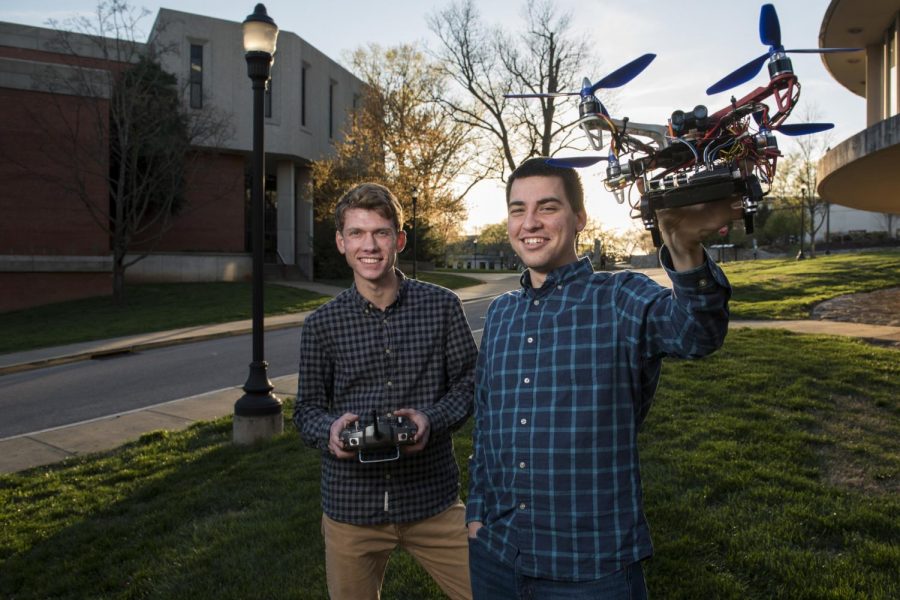WKU students work to create autonomous quadcopter
March 31, 2016
DRONES DASH
As time for WKU’s 46th Annual Student Research Conference dwindles, hundreds of students are putting the final touches on their talks, performances, posters, exhibits and displays. These participants include two WKU undergraduates who are finalizing preliminary work on a drone.
Louisville junior Connor Brooks and senior Chris Goulet of Munfordville are currently working on creating a completely autonomous, self-operable drone.
“The goal of the project is to build a quadcopter that can fly autonomously indoors,” Brooks said.
While many drones, including quadcopters, are flown outdoors, one of the team’s greatest challenges is to create a drone capable of flying indoors without human control.
“There are already some drones that navigate outside, but they solely rely on GPS,” Goulet said. “The unique problem with indoor navigation is that you can’t rely on a global positioning system, so you need to orient yourself indoors using sensors to sense the environment around it.”
The two began the project last spring, having no clue how to begin building their own drone, specifically the quadcopter, at the time.
“We’re computer science majors, so it was a very cross-discipline project,” Brooks said. “We had to learn a lot about things we had no idea about.”
Brooks said the two were required to do ample research before they could begin building and joked that there is no instruction guide for building a robot.
The pair first presented a prototype of their quadcopter at last year’s Student Research Conference, giving a poster presentation of the work they hoped to accomplish.
At this year’s conference, Brooks and Goulet will be giving a talk on the updated version of their copter. Brooks said this year, their copter will exhibit limited autonomy.
“Over the past year, we’ve finished building it, updated the hardware, and we reached limited autonomy,” Brooks said. “We can now fly around and avoid obstacles.”
After a few crashes, Brooks and Goulet were able to get their copter functioning on what Brooks called a low-level reactive behavior.
The two will be leaving their research after this semester to future students so others can continue to innovate. Brooks said the goal for their project is to set up a platform that will make it easier for future researchers to make the copter completely autonomous.
“Part of the goal of the project was to set up, basically, a platform for research into high-level control algorithms,” Brooks said.
Creating a high-level control quadcopter will allow the drone to actually map its environment and fly, self-operable, in that environment while avoiding obstacles.
“A student could potentially look into learning how to navigate this through the building and examining its environment at a more macroscale,” Goulet said. “Right now, it doesn’t know its position relative to the building.”
Brooks said what makes their research interesting is the flying component to their robot.
“One of the big things that makes it a much more difficult project, and also makes it kind of interesting, is that it’s flying,” Brooks said.
Drones like the quadcopter have grown in popularity and have the potential for many different uses, Brooks said. His and Goulet’s research has the potential to yield copters used for security, military and site monitoring purposes.
“Ideally, if you make something autonomous, it should be able to work faster than a human,” Goulet said.
Brooks said he looks forward to presenting their work at the research conference. He said the conference allows students to prepare for future endeavors and gives students chances to be recognized for potential jobs and internships.
“The biggest thing is just getting that experience,” Brooks said. “It gave us the confidence as we have applied to some of the bigger national conferences, and it was very beneficial to have that under our belts.”
Goulet agreed that he enjoys presenting at the research conference, an opportunity that not every undergraduate gets the chance to experience.
“There’s not a lot of opportunities for undergraduates to be involved in research, and this gives us an introduction to researching right in our local university,” Goulet said. “It’s quite exciting to see what other people are doing and taking full advantage of their education here at Western.”












